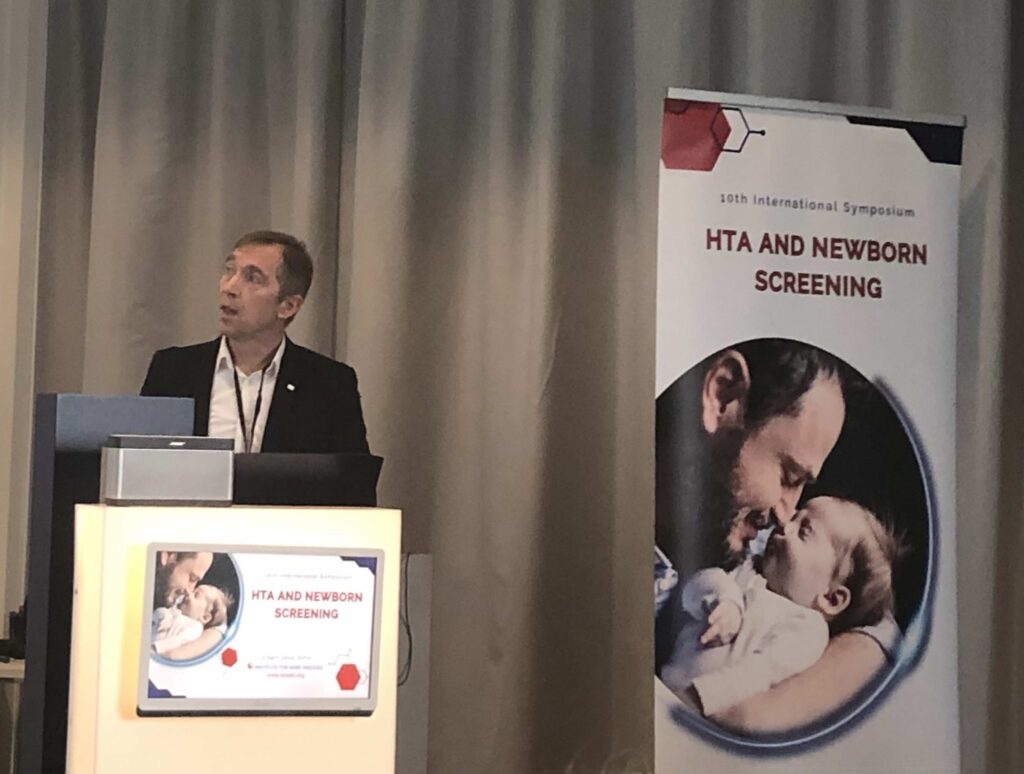 Newborn screening plays a crucial role in early detection of conditions in newborns. This leads to timely therapeutic interventions that can significantly improve outcomes. Ensuring quality and standardization of newborn screening procedures is crucial for its effectiveness. We had the privilege to interview Peter Schielen, Director of the International Society for Neonatal Screening (ISNS) office, an expert in quality issues and standardization of neonatal screening, and Editor-in-Chiefof the scientific journal “International Journal of Neonatal Screening”. Peter Schielen is a guest lecturer at the 10th International Symposium on Health Technology Assessment (5.04.2024 in Sofia) by invitation of the Institute for Rare Diseases.
Newborn screening plays a crucial role in early detection of conditions in newborns. This leads to timely therapeutic interventions that can significantly improve outcomes. Ensuring quality and standardization of newborn screening procedures is crucial for its effectiveness. We had the privilege to interview Peter Schielen, Director of the International Society for Neonatal Screening (ISNS) office, an expert in quality issues and standardization of neonatal screening, and Editor-in-Chiefof the scientific journal “International Journal of Neonatal Screening”. Peter Schielen is a guest lecturer at the 10th International Symposium on Health Technology Assessment (5.04.2024 in Sofia) by invitation of the Institute for Rare Diseases.
1. What are the key benefits of neonatal screening, particularly in terms of early detection and intervention?
2024 marks the beginning of the 7th decade since newborn screening began. In that time, we have tested more than 750 million babies around the world and offered early detection and life-changing treatment to almost 0.5 million. This important intervention is widely acclaimed as one of the most significant public health advances in recent decades. This success has secured the trust and confidence of families throughout the world, and where newborn screening is offered, uptake is typically more than 99%.
2. What are the critical success factors for expanding programs for neonatal screening, and how can stakeholders effectively address potential challenges?
The International Society for Neonatal Screening (ISNS) strongly encourages considering newborn screening as a system, not just a laboratory test. We should effectively concentrate on:
• Selection of (new) conditions in newborn screening panels should be based on published criteria; the procedures should be standardized, open to public scrutiny, and the result of deliberations should be published.
• Information (preferably communicated during pregnancy) describing the diseases to be tested and the implications of a positive result should be available to parents to permit an informed choice concerning participation.
• Clear case definitions of the screened disorders should be determined when screening is being planned.
• Screening should be undertaken in laboratories whose accreditation demonstrates compliance with international standards for laboratory performance (e.g., ISO15189).
• Laboratories and programs should be able to produce data on key performance indicators relating to the entire newborn screening process, including blood sampling, transport conditions, blood spot quality, time to generate a laboratory result, and refer screen-positive cases.
• Information should be available to parents at the time of clinical referral, the first contact should be with an experienced physician able to offer support, and, when appropriate, genetic counseling should be provided.
• Confirmatory testing should be established and consistently applied with a short and defined turnaround time to allay parental anxiety and stress.
• Plans to assess long-term outcome data should be in place and reported.
• Screen-negative results should be reported to all parents and form part of the child’s health record.
• Policies to store and access residual blood-spot samples should be defined and practice monitored.
• Newborn screening programs should be coordinated, and performance managed on a national basis to encourage continuous improvement.
3. Based on your experience and insights, what are the key learnings derived from the implementation of massive neonatal screening initiatives in EU countries, and how can these lessons be applied globally?
Europe still shows considerable variation in practice both in the way that newborn screening is conducted and in the number of conditions screened. The Number of conditions could be 2 – 48 conditions screened in different countries in Europe. Differences in countries around the globe could be even more significant. Within Europe, the ISNS stimulates collaboration in three critical areas:
• Produce overarching guidelines in the field of newborn screening for rare diseases.
• Developing an EU-wide platform on newborn screening for rare diseases and creating a European newborn screening standing committee.
• The EU as the central point for data collection and exchange of information on rare diseases newborn screening practices.
A fourth item would be to work towards the development and organization of newborn screening within Europe, under the umbrella of the European Reference Networks for rare diseases. The aim would be to have the ERNs at the center, with support from professional groups such as ISNS and patient groups such as International Patient Organization for Primary Immunodeficiencies (IPOPI), and to encourage our Alliance Group MEPs to recognize the need for such a group to help support health policy makers at a national level when exploring the role of newborn screening in the early detection and treatment of rare disorders.
